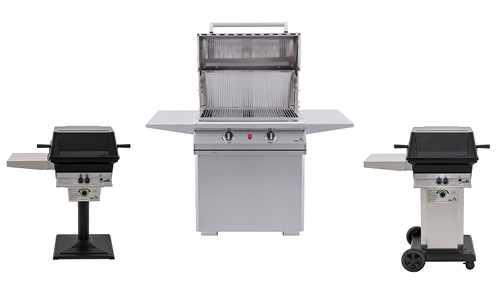11 minute read
|
Grills
When it comes to choosing a patio grill, the fuel type you select can significantly impact your experience in terms of convenience, portability, and compliance. For contractors, developers, and property owners managing multi-family spaces like apartments or condos, understanding the differences between natural gas, propane, and electric grills is essential. In this post, we’ll break down the advantages and disadvantages of each option to help you make an informed decision for your property. Natural gas grills are a top choice for many due to their ease of use and reliability. They connect directly to your property’s gas line, eliminating the need to refill tanks or worry about running out of fuel. Once installed, they provide a continuous supply of energy, making them ideal for regular use. However, they aren’t portable since they’re permanently connected to a gas line. Propane grills are known for their flexibility and portability. The fuel is stored in a tank that connects to the grill, allowing you to move it around as needed. This makes them perfect for properties where storage space is limited or when you want to grill in areas without access to gas or electricity. The only downside is that you'll need to refill the tank periodically. But with a few extra tanks on hand, this minor inconvenience is easily managed. Electric grills are gaining popularity, especially in cities with strict regulations on gas and propane appliances. Our e-grill connects to a NEMA 6-30 outlet, similar to those used for washers and dryers. While it isn’t portable, it offers an eco-friendly alternative, especially if your city uses renewable energy sources. Made from stainless steel, our electric grill is built to last and resistant to rust and corrosion. Natural Gas Grills: Great for common outdoor areas in multi-family buildings. They offer consistent performance without the hassle of refilling tanks. Propane Grills: Ideal for properties needing flexibility. Their portability allows storage when not in use and easy movement to different locations. Electric Grills: Perfect for eco-conscious properties or those complying with local regulations. Durable and low-maintenance, they fit well into modern designs. Natural Gas Grills: We offer a range of durable, easy-to-install models made from cast aluminum and stainless steel. Perfect for permanent setups. Propane Grills: Available in various styles and sizes, these are ideal for those who value mobility and versatility. Electric Grills: Our stainless steel model is designed for long-lasting use and environmental responsibility. It fits seamlessly into custom outdoor kitchens. Choosing the right patio grill depends on your lifestyle, budget, and environmental goals. Whether you go with natural gas, propane, or electric, each option has its unique benefits. For more information or assistance in selecting the best grill for your property, reach out to us today. Let’s find the perfect solution for your outdoor cooking needs! Want more information? Have a question? Contact us today, and we will be happy to help! Water Based Ink for Tempered Glass,Ink For Heat Resistant Tempered Glass,Environmentally friendly ink,Frosted Ink for Glass Door,High Density Screen Printing Ink Lauer Water-Based New Material(Foshan)Co.,Ltd. , https://www.lauerink.comCompare Natural Gas vs Propane vs Electric for Patio Grills

Understanding the Different Fuel Types for Outdoor Patio Grills
Natural Gas Grills
Propane Grills
Electric Grills
Detailed Comparison of Fuel Types
Convenience and Installation
Eco-Friendliness
Cost Considerations
Practical Applications for Multi-Family Properties
Our Product Offerings
Making the Right Choice
Factors to Consider
Recommendations
Go Back To Blog
Tempered Glass Ink is revolutionizing the world of design and customization. This innovative ink is specially formulated to adhere to tempered glass surfaces, providing a durable and vibrant solution for a variety of applications. Whether you want to add a personalized touch to glassware, electronics, or architectural elements, tempered glass ink offers a versatile and long-lasting option for creating stunning designs.One of the main advantages of tempered glass ink is its exceptional durability. Unlike traditional inks that may wear off or fade over time, tempered glass inks are designed to withstand the rigors of daily use.